A Sense of Service
Ramadan is a time for compassion and giving to others – and these values were illustrated by socially-conscious Qatar Foundation (QF) students during the Holy Month.
The Grade 5 students at Qatar Academy Doha (QAD) – part of QF’s Pre-University Education – distributed around 2,000 iftar meals to contracted workers at Education City through an initiative called Ajar, demonstrating both their sense of generosity and citizenship, and QF’s commitment to the welfare and wellbeing of its workers.
Helped by teachers, the students prepared between 150 and 200 meals a day over a two-week period, with the initiative – supervised by QF’s Health, Safety and Environment directorate and workers welfare team – also raising awareness of food sustainability. As QAD teacher Shagufta Rashid said: “The students made sure to provide these meals to the workers themselves, expressing their appreciation for what these workers were doing for them.
“It was touching to see how the students felt about this, and their belief that doing good is an integral part of fasting.”
Ramadan is a time for compassion and giving to others – and these values were illustrated by socially-conscious Qatar Foundation (QF) students during the Holy Month.
The Grade 5 students at Qatar Academy Doha (QAD) – part of QF’s Pre-University Education – distributed around 2,000 iftar meals to contracted workers at Education City through an initiative called Ajar, demonstrating both their sense of generosity and citizenship, and QF’s commitment to the welfare and wellbeing of its workers.
Helped by teachers, the students prepared between 150 and 200 meals a day over a two-week period, with the initiative – supervised by QF’s Health, Safety and Environment directorate and workers welfare team – also raising awareness of food sustainability. As QAD teacher Shagufta Rashid said: “The students made sure to provide these meals to the workers themselves, expressing their appreciation for what these workers were doing for them.
“It was touching to see how the students felt about this, and their belief that doing good is an integral part of fasting.”
From epitomizing the spirit of Ramadan, to representing Qatar on the global research stage, to solving real-life sustainability challenges, QF’s youth demonstrated their social awareness and passion for knowledge.
Giving is one of the most important basics of our Islamic religion, and the month of Ramadan is an ideal opportunity to do good deeds.
Qatar Academy Doha has almost 1,900 students in the 2022-23 academic year
Knowledge Ambassadors
Sharing their passion for science and research with like-minded students and expert mentors from around the world, eight young people from Qatar headed to London to represent their nation at a STEM-focused global youth forum.
The opportunity to be part of the London International Youth Science Forum – which offered a 15-day STEM camp to students aged from 16-21 – was provided by a collaboration between QF, its Hamad Bin Khalifa University, and the Ministry of Education and Higher Education’s Youth Science Forum, which encourages and empowers high school students to unlock their scientific creativity.
Under the theme ‘Science for Society’, the 2022 edition of the forum – one of the longest-running STEM events of its kind – explored global challenges such as climate change, viruses, and cybersecurity, and how science can tackle them.
Among the participating students from Qatar was Lara Michaella Espiritu, whose science project with a school colleague focused on using solar power to desalinate seawater, and who said: “It has been one of our dreams to help position Qatar in leading a new era of desalination, so this opportunity is exciting for us.”
Sharing their passion for science and research with like-minded students and expert mentors from around the world, eight young people from Qatar headed to London to represent their nation at a STEM-focused global youth forum.
The opportunity to be part of the London International Youth Science Forum – which offered a 15-day STEM camp to students aged from 16-21 – was provided by a collaboration between QF, its Hamad Bin Khalifa University, and the Ministry of Education and Higher Education’s Youth Science Forum, which encourages and empowers high school students to unlock their scientific creativity.
Under the theme ‘Science for Society’, the 2022 edition of the forum – one of the longest-running STEM events of its kind – explored global challenges such as climate change, viruses, and cybersecurity, and how science can tackle them.
Among the participating students from Qatar was Lara Michaella Espiritu, whose science project with a school colleague focused on using solar power to desalinate seawater, and who said: “It has been one of our dreams to help position Qatar in leading a new era of desalination, so this opportunity is exciting for us.”
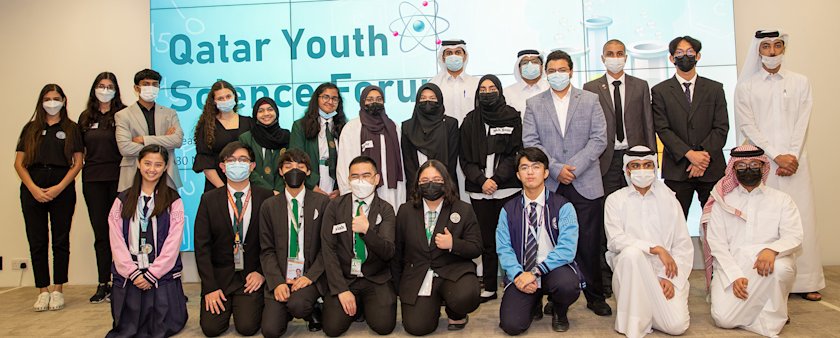
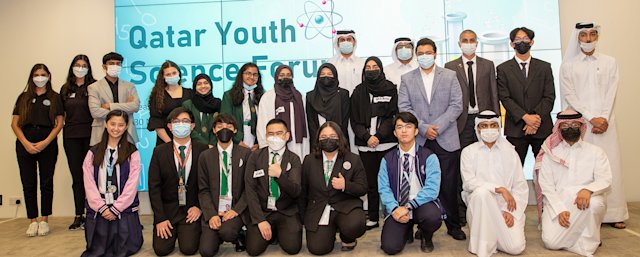
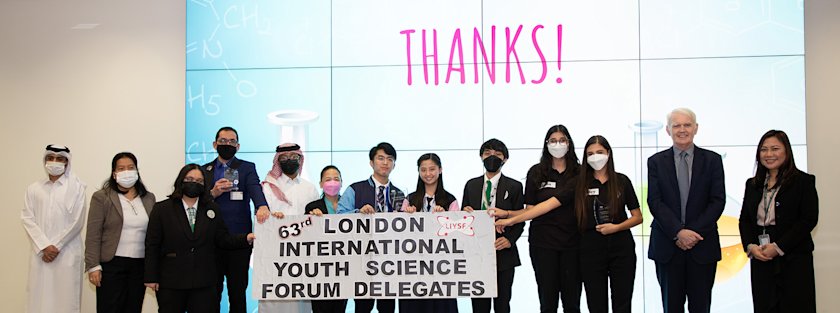
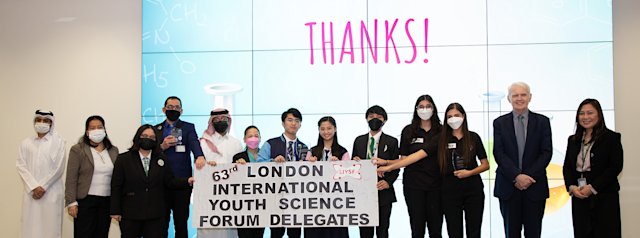
My advice to other young innovators seeking to make a mark and build their ongoing studies is to make best use of the opportunities available in Qatar – and remain determined and never lose hope.
Learning for Reality
The skills QF students learn in the classroom, and their determination to apply them to real-world challenges, were combined with the expertise within a QF partner university – to build underwater robots that can protect marine life and help prevent oil spills.
Through a collaboration between Qatar Academy for Science and Technology (QAST) and Texas A&M University at Qatar, the school students learned about the engineering principles behind remotely operated vehicles, intended to inspire them to pursue STEM subjects when they enter university.
The robots created by the students can free marine animals stuck in fishing nets, and monitor underwater pipelines for rust and cracks – showing them how simple and inexpensive tools can be used to engineer solutions to global problems.
“The main objective of this activity is to show that the skills student acquire at QAST are not isolated from reality,” said QAST Innovation Center teacher Ahmad Al-Mansoor. “They can apply what they’ve learned in science classes to building robots, and at the same time they’ve studied the basics of engineering, including how an engineer thinks and the tools they use.”
The skills QF students learn in the classroom, and their determination to apply them to real-world challenges, were combined with the expertise within a QF partner university – to build underwater robots that can protect marine life and help prevent oil spills.
Through a collaboration between Qatar Academy for Science and Technology (QAST) and Texas A&M University at Qatar, the school students learned about the engineering principles behind remotely operated vehicles, intended to inspire them to pursue STEM subjects when they enter university.
The robots created by the students can free marine animals stuck in fishing nets, and monitor underwater pipelines for rust and cracks – showing them how simple and inexpensive tools can be used to engineer solutions to global problems.
“The main objective of this activity is to show that the skills student acquire at QAST are not isolated from reality,” said QAST Innovation Center teacher Ahmad Al-Mansoor. “They can apply what they’ve learned in science classes to building robots, and at the same time they’ve studied the basics of engineering, including how an engineer thinks and the tools they use.”
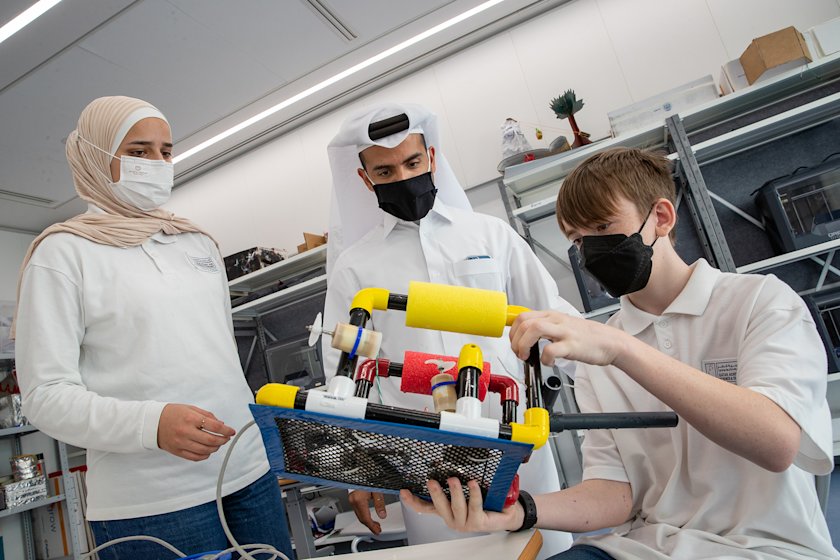
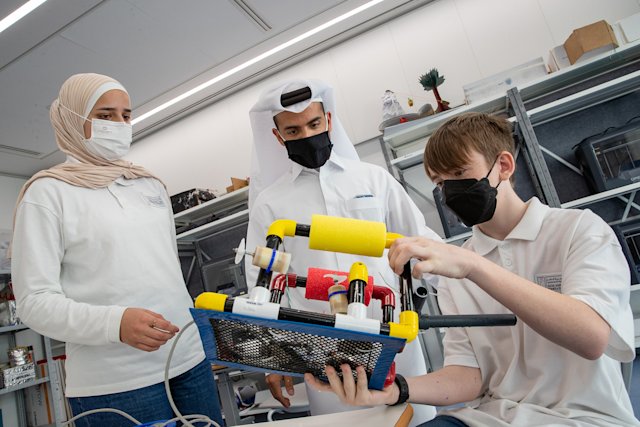
We aim to help students learn about various fields of engineering from an early age and explore solutions to the environmental challenges facing Qatar and the wider world.
QAST has 79 students in the 2022-23 academic year
Principles for the Planet
The impact of daily lifestyle choices on climate change were spotlighted at an “ideathon” hosted by QF’s Hamad Bin Khalifa University (HBKU) and Qatargas that connected Islamic values with sustainability efforts.
Presented by Maker Majlis – a platform under HBKU’s College of Islamic Studies (CIS) – saw the college’s students and researchers pinpoint their individual carbon footprint using a Qatargas calculator, encouraging environmental stewardship in keeping with the principles of Islam.
Meanwhile, the importance of strong and cohesive families in the fabric of societies in the Arab world was underscored by QF’s Doha International Family Institute during a CIS-organized lecture series that advocated for the inclusion of premarital education programs in school curricula.
During the series, DIFI experts emphasized the need for increased employee benefits, flexible working hours, and extended paid maternity leave to enhance family cohesion, as well as providing children’s nurseries and nursing spaces within workplaces to support work-life balance and strengthen family values in society.
The impact of daily lifestyle choices on climate change were spotlighted at an “ideathon” hosted by QF’s Hamad Bin Khalifa University (HBKU) and Qatargas that connected Islamic values with sustainability efforts.
Presented by Maker Majlis – a platform under HBKU’s College of Islamic Studies (CIS) – saw the college’s students and researchers pinpoint their individual carbon footprint using a Qatargas calculator, encouraging environmental stewardship in keeping with the principles of Islam.
Meanwhile, the importance of strong and cohesive families in the fabric of societies in the Arab world was underscored by QF’s Doha International Family Institute during a CIS-organized lecture series that advocated for the inclusion of premarital education programs in school curricula.
During the series, DIFI experts emphasized the need for increased employee benefits, flexible working hours, and extended paid maternity leave to enhance family cohesion, as well as providing children’s nurseries and nursing spaces within workplaces to support work-life balance and strengthen family values in society.
Encouraging students to explore the nexus between Islam, sustainability, and their individual carbon footprint was at the heart of our ideathon.
DIFI aims to advance knowledge on, and strengthen, Arab families through:
- Research
- Policy
- Outreach
- Advocacy
Inside Science
With the aim of engaging students in Qatar’s schools to explore precision health and genomics, QF and the Ministry of Education and Higher Education teamed up to bring the latest developments in this field to biology teachers – so they can share it with their learners and inspire them to be the next generation of genomics leaders.
A series of workshops held through a partnership between the Ministry and QF’s Qatar Genome Programme (QGP) focused on advancements on genomic science, reflecting Qatar’s position as a genomics pioneer and the inclusion of concept of the human genome in secondary schools’ biology curriculum. The aim is to encourage students to engage with the field at a young age, equipping them to ultimately add to Qatar’s ranks of talent in this field.
“Genomics has become the talk of the hour,” said Dima Darwish, QGP’s Head of Scientific Education. “We need the next generation to understand the importance of precision medicine and to work in the field, in Qatar and the region.
“To that end, they will benefit from the guidance and encouragement of their teachers, and contribute to improving healthcare in the region.”
With the aim of engaging students in Qatar’s schools to explore precision health and genomics, QF and the Ministry of Education and Higher Education teamed up to bring the latest developments in this field to biology teachers – so they can share it with their learners and inspire them to be the next generation of genomics leaders.
A series of workshops held through a partnership between the Ministry and QF’s Qatar Genome Programme (QGP) focused on advancements on genomic science, reflecting Qatar’s position as a genomics pioneer and the inclusion of concept of the human genome in secondary schools’ biology curriculum. The aim is to encourage students to engage with the field at a young age, equipping them to ultimately add to Qatar’s ranks of talent in this field.
“Genomics has become the talk of the hour,” said Dima Darwish, QGP’s Head of Scientific Education. “We need the next generation to understand the importance of precision medicine and to work in the field, in Qatar and the region.
“To that end, they will benefit from the guidance and encouragement of their teachers, and contribute to improving healthcare in the region.”
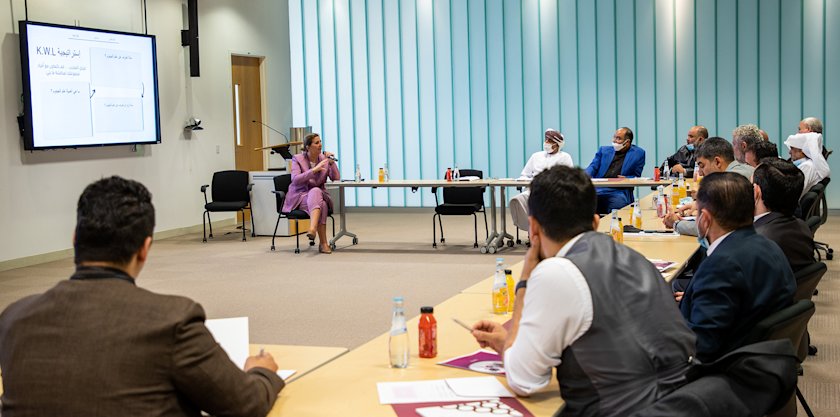
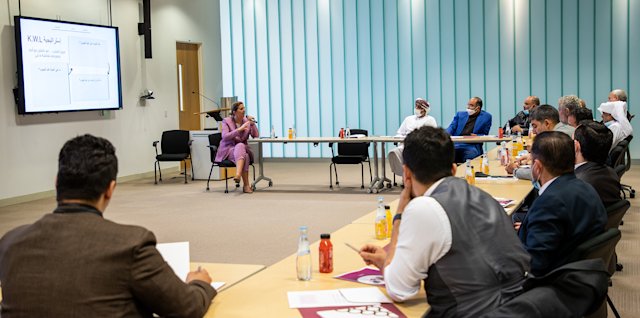
Secondary school teachers from 50 schools in Qatar participated in the genomics and precision health workshops
31,000 whole genomes have been sequenced in Qatar
Keeping Health Within Reach
With smartwatches now part of daily life, a QF research institute created a platform that can use these accessories to help keep people healthy.
Qatar Computing Research Institute’s eHealth innovation – System for Integrated Lifestyle Health Analytics, or SIHA – can harness data from wearable devices and enable doctors to access it, so they can devise treatment plans for the wearer and track their lifestyle changes. In 2022, the platform was made available for licensing and has been tested in clinical trials within Qatar’s healthcare system.
“Lifestyle data captured by wearables can be particularly useful in chronic disease management, but the challenge has been that clinicians don’t have a way to access it,” said Ummar Abbas, Senior Software Engineer at QCRI, which is part of QF member Hamad Bin Khalifa University.
“We would like to see our system being integrated into regular clinical Electronic Health Record systems and be a part of the regular hospital workflow in the country.”
With smartwatches now part of daily life, a QF research institute created a platform that can use these accessories to help keep people healthy.
Qatar Computing Research Institute’s eHealth innovation – System for Integrated Lifestyle Health Analytics, or SIHA – can harness data from wearable devices and enable doctors to access it, so they can devise treatment plans for the wearer and track their lifestyle changes. In 2022, the platform was made available for licensing and has been tested in clinical trials within Qatar’s healthcare system.
“Lifestyle data captured by wearables can be particularly useful in chronic disease management, but the challenge has been that clinicians don’t have a way to access it,” said Ummar Abbas, Senior Software Engineer at QCRI, which is part of QF member Hamad Bin Khalifa University.
“We would like to see our system being integrated into regular clinical Electronic Health Record systems and be a part of the regular hospital workflow in the country.”
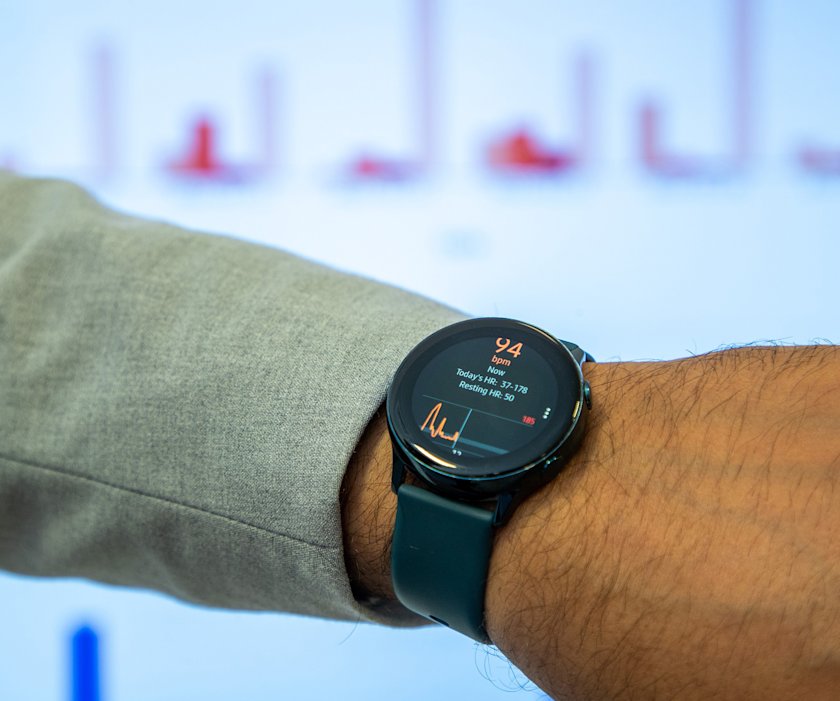
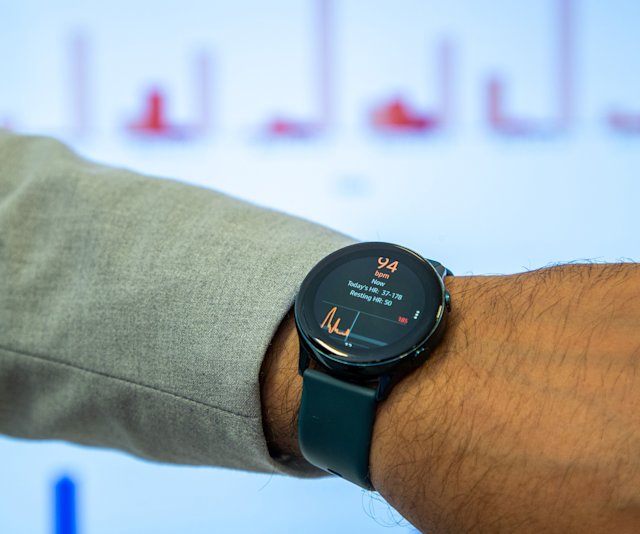
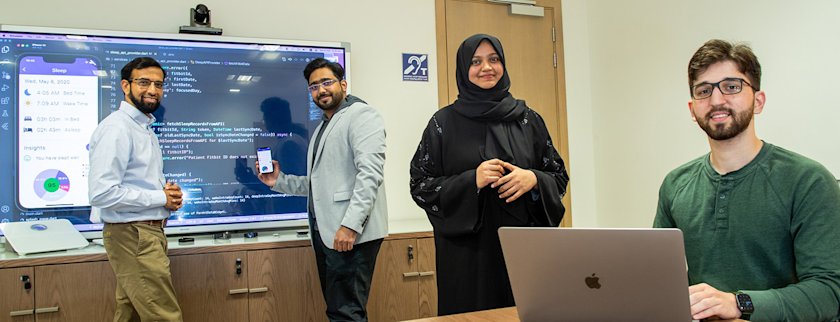
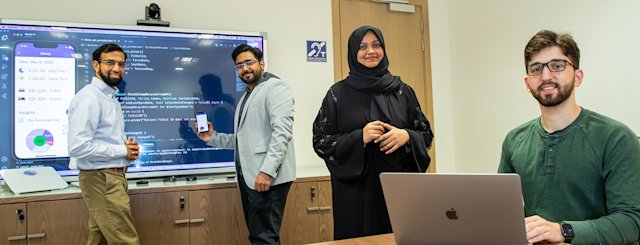
Having access to wearable data will allow clinicians to qualitatively track changes in the lifestyle of their patients.
Where Arabic meets EdTech
Digital content in Arabic tailored to meet today’s needs and bring language learning to life was opened up the world – through QF’s global education think tank WISE.
Kamkalima is an Arabic educational platform for Arabic content that is fun, contemporary, and supports Arabic education – from reading and listening to writing and speaking. And, thanks to WISE, it has expanded its scope to the international edtech scene.
The QF initiative chose Kamkalima to join its WISE EdTech Accelerator – which helps to advance edtech solutions that can positively impact education – after spotting its potential to fill a gap in the digital learning revolution: the lack of Arabic content for teachers to create engaging learning experiences for students. Through Kamkalima – which has been tested in QF schools – educators are provided with study plans in reading, expression, and listening, as well as resources and academic texts.
“We dream of a generation who invent solutions in their mother tongue,” said Kamkalima co-founder Nisrine El Makkouk. “And to help this dream be realized, we try to create spaces for learning that belong to us, our environment, and our identity, rather than coming from outside.”
Digital content in Arabic tailored to meet today’s needs and bring language learning to life was opened up the world – through QF’s global education think tank WISE.
Kamkalima is an Arabic educational platform for Arabic content that is fun, contemporary, and supports Arabic education – from reading and listening to writing and speaking. And, thanks to WISE, it has expanded its scope to the international edtech scene.
The QF initiative chose Kamkalima to join its WISE EdTech Accelerator – which helps to advance edtech solutions that can positively impact education – after spotting its potential to fill a gap in the digital learning revolution: the lack of Arabic content for teachers to create engaging learning experiences for students. Through Kamkalima – which has been tested in QF schools – educators are provided with study plans in reading, expression, and listening, as well as resources and academic texts.
“We dream of a generation who invent solutions in their mother tongue,” said Kamkalima co-founder Nisrine El Makkouk. “And to help this dream be realized, we try to create spaces for learning that belong to us, our environment, and our identity, rather than coming from outside.”
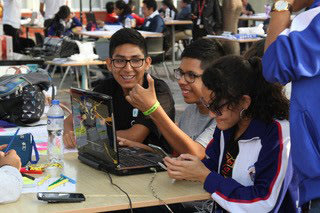

We are very optimistic about the digital future of the Arabic language.
20,000 students and 450 teachers are now using the Kamkalima platform
The WISE education community comprises 150 organizations, projects, and startups that are benefiting over 250 million people
The Accessible Approach
With the FIFA World Cup Qatar 2022™ approaching, children and young people in Qatar were able to learn about the legacy of the tournament while also developing core skills, through an online education platform made truly accessible with the support of QF.
The Learning Center and Renad Academy – part of QF’s Pre-University Education – developed two accessibility toolkits, catering to students with autism and cognitive disabilities or learning challenges, for Tamreen, an interactive platform launched by the Supreme Committee for Delivery & Legacy in partnership with the Ministry of Education and Higher Education. The toolkits were created based on QF educators’ knowledge of students with special educational needs they have taught during their careers.
And on the World Cup front, Qatari singer Aisha – an alumna of QF partner university Virginia Commonwealth University School of the Arts in Qatar – found stardom as she featured on ‘Hayya Hayya (Better Together)’, the first single to be released from the tournament’s official soundtrack.
“I am blessed and honored to exist in these exciting times, where I get to witness and be part of this huge milestone for my country, Qatar,” said Aisha.
With the FIFA World Cup Qatar 2022™ approaching, children and young people in Qatar were able to learn about the legacy of the tournament while also developing core skills, through an online education platform made truly accessible with the support of QF.
The Learning Center and Renad Academy – part of QF’s Pre-University Education – developed two accessibility toolkits, catering to students with autism and cognitive disabilities or learning challenges, for Tamreen, an interactive platform launched by the Supreme Committee for Delivery & Legacy in partnership with the Ministry of Education and Higher Education. The toolkits were created based on QF educators’ knowledge of students with special educational needs they have taught during their careers.
And on the World Cup front, Qatari singer Aisha – an alumna of QF partner university Virginia Commonwealth University School of the Arts in Qatar – found stardom as she featured on ‘Hayya Hayya (Better Together)’, the first single to be released from the tournament’s official soundtrack.
“I am blessed and honored to exist in these exciting times, where I get to witness and be part of this huge milestone for my country, Qatar,” said Aisha.
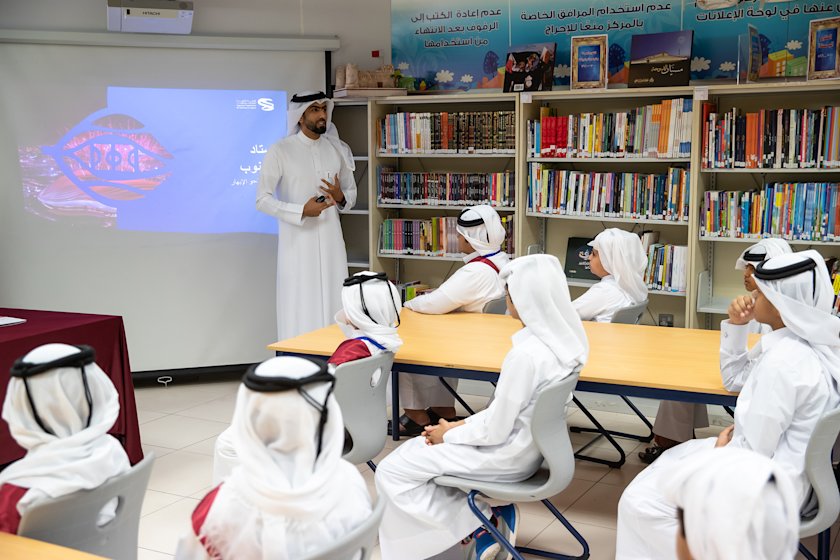
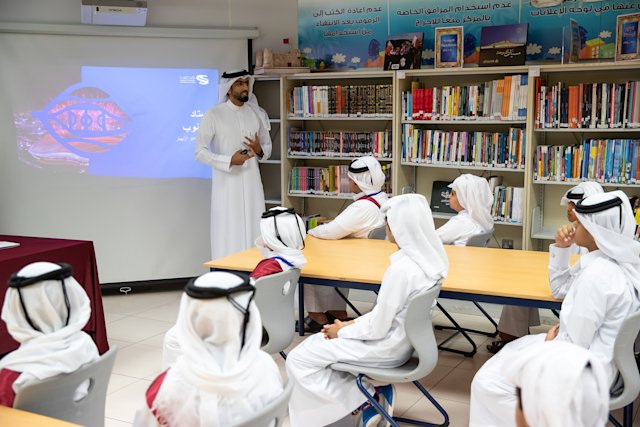
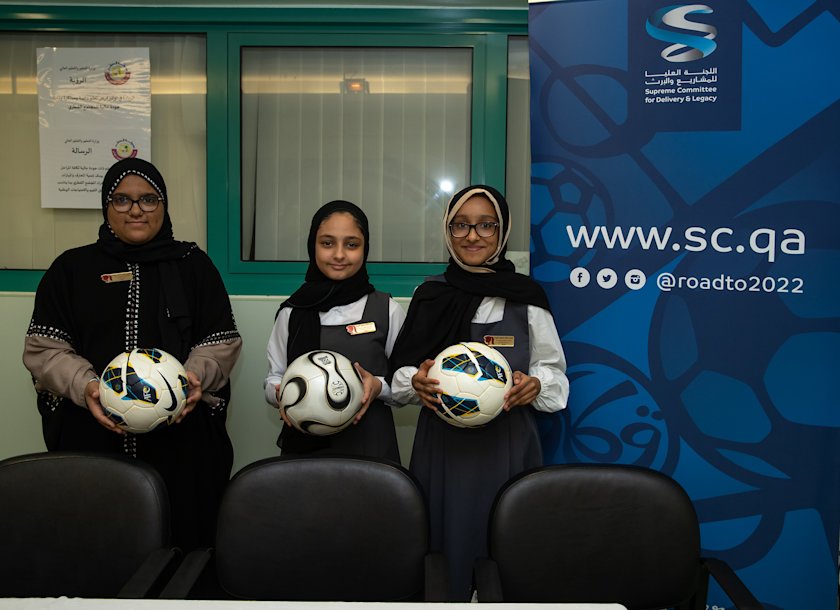
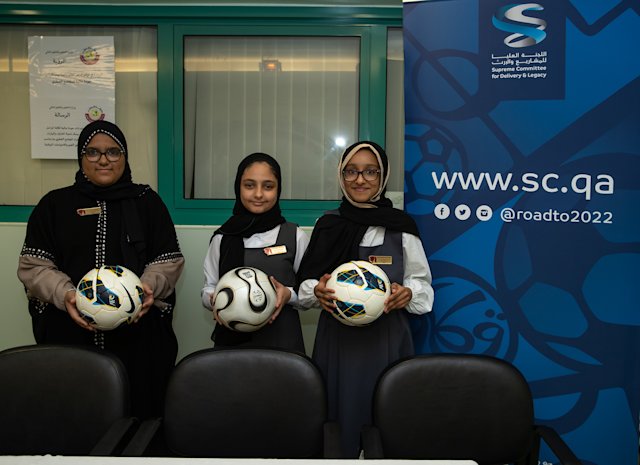
Not only are we reaching a broad range of students with needs, but also making these learning experiences real by giving our students a chance to live football and the community it brings with it.
Over 200 government schools and 20 private schools registered for the Tamreen program
Sport Without Boundaries
Breaking down barriers to opportunity is at the core of QF’s mission and ecosystem – and that includes making sure everyone can enjoy sports.
April saw QF’s Qader Award – an initiative that removes financial hurdles to inclusive sporting avenues for children and their families – enter its fourth cycle, with recipients being able to register for QF’s Ability Friendly Program in either swimming or football for a full academic year, at no cost.
Since its launch in 2018, the Ability Friendly Program has been supporting people of all abilities to participate in sport and developmental activities at QF’s Education City, and in Al Khor and Al Wakra, through offering specialized classes, seasonal camps, and events tailored to individual needs and abilities.
“We recognized that, for some families, cost can be an obstacle to participating in a program that would bring great value and enjoyment to them,” said Kathleen Bates, Senior ASD/Special Needs Aquatic Specialist and Coach at QF. “This is why we created the Qader Award.”
Breaking down barriers to opportunity is at the core of QF’s mission and ecosystem – and that includes making sure everyone can enjoy sports.
April saw QF’s Qader Award – an initiative that removes financial hurdles to inclusive sporting avenues for children and their families – enter its fourth cycle, with recipients being able to register for QF’s Ability Friendly Program in either swimming or football for a full academic year, at no cost.
Since its launch in 2018, the Ability Friendly Program has been supporting people of all abilities to participate in sport and developmental activities at QF’s Education City, and in Al Khor and Al Wakra, through offering specialized classes, seasonal camps, and events tailored to individual needs and abilities.
“We recognized that, for some families, cost can be an obstacle to participating in a program that would bring great value and enjoyment to them,” said Kathleen Bates, Senior ASD/Special Needs Aquatic Specialist and Coach at QF. “This is why we created the Qader Award.”
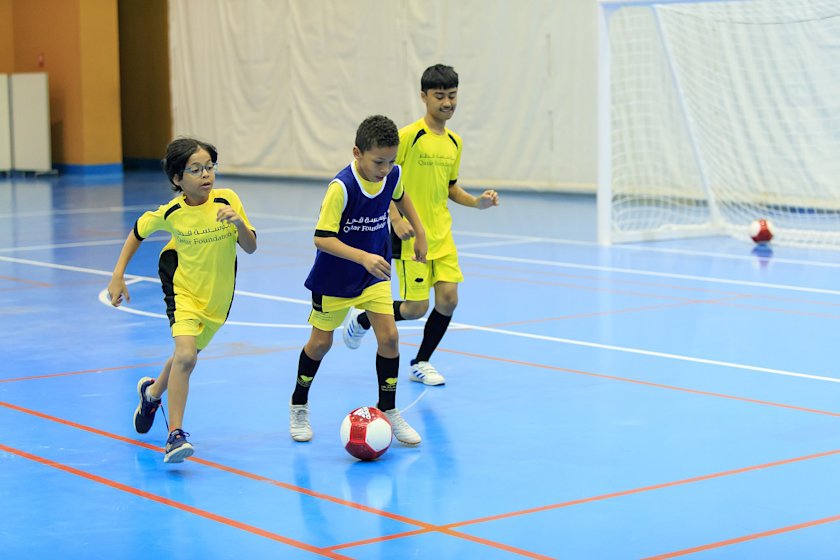
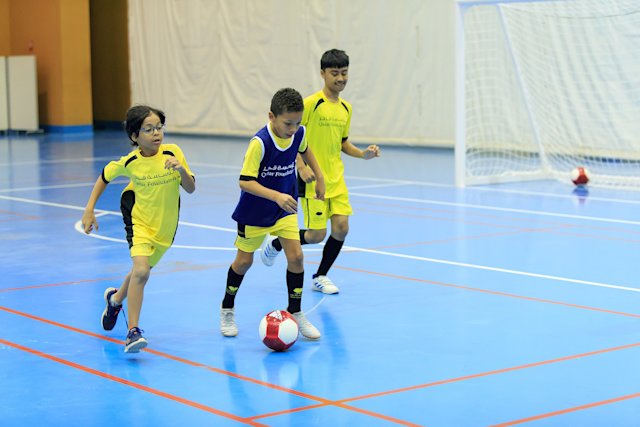
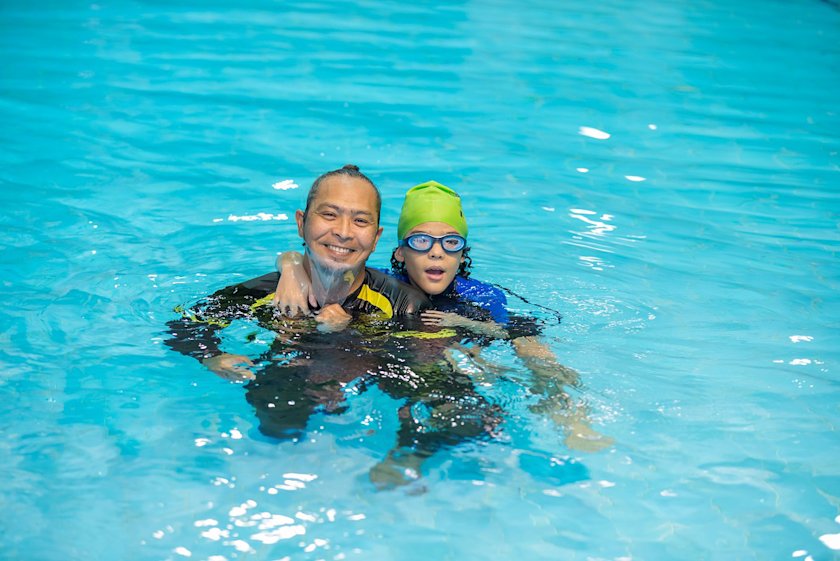
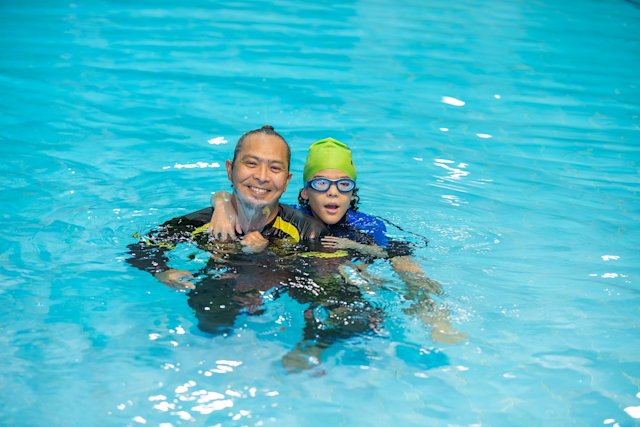
126 people have benefited from the Qader Award over its four cycles.
Awareness and Enjoyment
The arrival of April also meant the arrival of Autism Acceptance Month, and of World Autism Awareness Day – which takes place every year on April 2, having first been proposed by Her Highness Sheikha Moza bint Nasser, Chairperson of Qatar Foundation, in 2007 and adopted without a vote by the United Nations General Assembly.
To mark this day, and raise awareness of the needs and challenges of children with autism, QF staged a family event – Autism Vibes – at Education City, providing fun for the community while also playing a role in educating them about the disorder.
Organized by the Autismparents.qa group and QF’s Ability Friendly Program, the event included a Walk for Autism around Education City’s Oxygen Park; football, cricket, and playball sessions for children; a musical performance courtesy of QF’s D’reesha Performing Arts Festival; and sessions with QF member Al Shaqab’s Equine Assisted Therapy Team.
And children attending the event also received a special welcome from a television favorite – an on-screen message from Julia, the first character from Sesame Street with autism – while World Autism Acceptance Day saw the 2015 Building (QF Headquarters) lit in blue to mark the occasion.
The arrival of April also meant the arrival of Autism Acceptance Month, and of World Autism Awareness Day – which takes place every year on April 2, having first been proposed by Her Highness Sheikha Moza bint Nasser, Chairperson of Qatar Foundation, in 2007 and adopted without a vote by the United Nations General Assembly.
To mark this day, and raise awareness of the needs and challenges of children with autism, QF staged a family event – Autism Vibes – at Education City, providing fun for the community while also playing a role in educating them about the disorder.
Organized by the Autismparents.qa group and QF’s Ability Friendly Program, the event included a Walk for Autism around Education City’s Oxygen Park; football, cricket, and playball sessions for children; a musical performance courtesy of QF’s D’reesha Performing Arts Festival; and sessions with QF member Al Shaqab’s Equine Assisted Therapy Team.
And children attending the event also received a special welcome from a television favorite – an on-screen message from Julia, the first character from Sesame Street with autism – while World Autism Acceptance Day saw the 2015 Building (QF Headquarters) lit in blue to mark the occasion.





